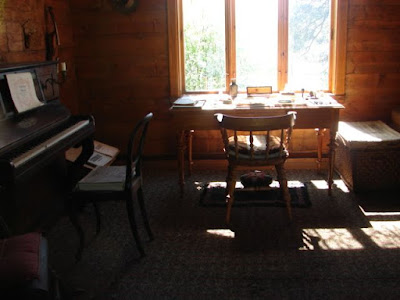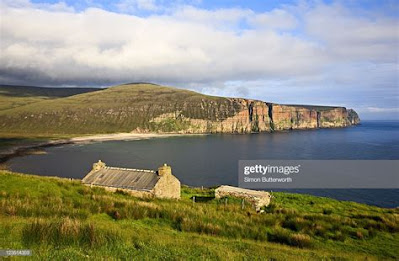Troldhaugen is the name of the former residence of Norwegian composer Edvard Grieg and it has, apart from living quarters, Grieg's "composing hut" overlooking Nordås Lake. Here is a photo of the hut:
. Stravinsky composed the Rite of Spring in a similar environment:
In October he left Ustilug for Clarens in Switzerland, where in a tiny and sparsely-furnished room—an 8-by-8-foot (2.4 by 2.4 m) closet, with only a muted upright piano, a table and two chairs—he worked throughout the 1911–12 winter on the score. [Wikipedia]
Indeed, it is not unusual for composers to retreat to a tiny, isolated environment to compose. Mahler composed in a similar tiny hut overlooking Lake Attersee in Upper Austria. The hut even has its own Wikipedia page:
And here is the interior:
Mahler had a second composing hut near Maiernigg:
While I suspect that lots of other composers had similar huts, I can't find photos of them online. When I attended The Banff Centre many years ago, the extensive grounds were dotted with isolated little practice huts for musicians, writers and composers to work in. Here is a photo of the simplest ones:
This is the dream of many composers, writers and musicians, of course. The key elements are complete separation from other people and their noises (and the noises of their pets). You cannot imagine the sheer frustration when you are just working out some sound-combination in your mind or on the piano when next door Fido unleashes a furious round of barking or your neighbor decides he really needs to hear some Grateful Dead at high volume. The delicate, only half-comprehended idea vanishes like mist in the morning.
What do composers need even more than commissions and premieres? Solitude.
Here is the Peer Gynt Suite No. 1 by Edvard Grieg:
UPDATE: A commentator reminds me of composer Peter Maxwell Davies' croft in the Orkney Islands:









Peter Maxwell Davies had a croft on one of the Orkney islands, at the northern edge of Britain, very sparsely populated and rather cold and formidable (though they have nothing on northern Canada, I'm sure). Always looked idyllic to me. It also brings up the question of how much the environment in which one composes affects the character of one's compositions. I've seen it suggested that there is a discernible difference between Davies's pre- and post-Orkney compositions. I think I can see this too, but to what extent his move to island began this change, or whether it was that his change in attitude made him seek out the island, I don't know. I recall Davies discussing how the sounds of the island unconsciously made they way into his compositions, which is unsurprising, especially given the kind of composer he was. It's also notable that he was quite a prolific composer -- I'm sure his retreating to a distant island must have helped!
ReplyDeleteI recall Radio 3 had a series years ago called something like 'From the Composer's Desk' where they interviewed composers in the rooms in which they composed and asked about the environment in which they like to compose. The one thing I remember was about the piano: whether the composers were facing with their back to it, or had it to their side, or even whether they had one in the room... It was a subject that kept coming up.
Thanks, Steven, I should have thought of Peter Maxwell Davies. I found a photo that I will update the post with.
ReplyDelete